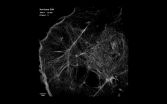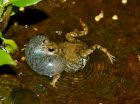Queen's researcher playing an important role improving psychology research
2015-08-27
(Press-News.org) KINGSTON - Queen's University developmental psychology professor Stanka Fitneva has co-authored a study in the journal Science that, for the first time, explores the replicability of psychology research.
The Reproducibility Project: Psychology, launched nearly four years ago, is one of the first crowdsourced research studies in the field. The researchers' most important finding was that, regardless of the analytic method or criteria used, fewer than half of their studies produced the same findings as the original study.
"This is a unique project in psychology, and maybe in all of science," says Dr. Fitneva. "It's the first crowdsourcing project where a number of labs from universities all around the world are involved in an effort to see to what extent findings that are published in major journals can be replicated by independent labs."
The 270 researchers in the study, at facilities around the globe, re-examined studies from the 2008 issues of three peer-reviewed journals and attempted to reproduce the results of the study. While the project hypothesized a reproducibility rate approaching 80 per cent, the authors were surprised to discover that less than half of the target findings were reproduced. Dr. Fitneva's team attempted to reproduce the results of an earlier study into the effects of language on children's object representation.
Dr. Fitneva and her co-authors propose three possible reasons for the surprising lack of reproducibility they encountered: small differences in how the studies were carried out; a random chance failure to detect the original result; or the possibility the original itself was a false positive. In addition, they highlight another possibility - the pre-eminence placed on new and innovative discoveries has incentivized researchers to aim for "new" rather than "reproducible" findings.
"Publication bias in science is a major issue and, in the last couple of years, more and more has surfaced about the detrimental consequences of this bias," says Dr. Fitneva. "Just like in any aspect of human activity, there are incentives that influence the conduct of research. Our journals have been prioritizing the publication of, and thus rewarding researchers for, novel and surprising findings.
"When we find something surprising it catches the imagination of the public and the media just as much as it catches the imagination of researchers and journal editors. We need to balance the verification processes in science against the drive for innovation" she adds. "Assessing the reproducibility of findings is essential for scientific progress but currently researchers receive few rewards for engaging in this practice."
INFORMATION:
The full results of the Reproducibility Project: Psychology have been published in the journal Science.
ELSE PRESS RELEASES FROM THIS DATE:
2015-08-27
Scientists can now watch dynamic biological processes with unprecedented clarity in living cells using new imaging techniques developed by researchers at the Howard Hughes Medical Institute's Janelia Research Campus. The new methods dramatically improve on the spatial resolution provided by structured illumination microscopy, one of the best imaging methods for seeing inside living cells.
The vibrant videos produced with the new technology show the movement and interactions of proteins as cells remodel their structural supports or reorganize their membranes to take up ...
2015-08-27
A study that sought to replicate 100 findings published in three prominent psychology journals has found that, across multiple criteria, independent researchers could replicate less than half of the original findings. In some cases this may call into question the validity of some scientific findings, but it may also point to the difficulty of conducting effective replications and achieving reproducible results.
The results of this review study, conducted by more than 270 researchers on five continents, are published in the Aug. 28 issue of the journal Science. Twenty-two ...
2015-08-27
This news release is available in Japanese.
Following one of the largest-scale scientific reproducibility investigations to date, a group of psychology researchers has reported results from an effort to replicate 100 recently published psychology studies; though they were able to successfully repeat the original experiments in most all cases, they were able to reproduce the original results in less than half, they report. The authors - part of the Reproducibility Project: Psychology, and led by Brian Nosek - emphasize that a failure to reproduce does not necessarily ...
2015-08-27
This news release is available in Japanese.
Researchers have significantly extended the resolution of live-cell Structured Illumination Microscopy (SIM), a type of microscopy that offers many benefits compared to other super resolution techniques. The results are already providing a much more detailed understanding of cell processes and could have important implications for health research. Currently, many other super resolution microscopes come with pitfalls; for example, localization microscopy and stimulated emission depletion microscopy must use high ...
2015-08-27
This news release is available in Japanese.
In the attempt to choose a mate, it's no surprise that females will select the more "attractive" of two males, but now a new study reveals that female túngara frogs are susceptible to the "decoy" effect, where the introduction of a third, inferior mate results in the female choosing the less attractive of the first two options. The results of this study counter the rational choice models that are currently used in sexual selection theory, suggesting they may prove inadequate to explain decisions in socially ...
2015-08-27
HOUSTON - (Aug. 27, 2015) - Rice University scientists have made a living circuit from multiple types of bacteria that prompts the bacteria to cooperate to change protein expression.
The subject of a new paper in Science, the project represents the first time the Rice researchers have created a biological equivalent to a computer circuit that involves multiple organisms to influence a population.
The researchers' goal is to modify biological systems by controlling how bacteria influence each other. This could lead to bacteria that, for instance, beneficially alter ...
2015-08-27
Before Ibuprofen can relieve your headache, it has to dissolve in your bloodstream. The problem is Ibuprofen, in its native form, isn't particularly soluble. Its rigid, crystalline structures -- the molecules are lined up like soldiers at roll call -- make it hard to dissolve in the bloodstream. To overcome this, manufacturers use chemical additives to increase the solubility of Ibuprofen and many other drugs, but those additives also increase cost and complexity.
The key to making drugs by themselves more soluble is not to give the molecular soldiers time to fall in ...
2015-08-27
As President Obama and high-level representatives of other nations converge in Anchorage, Alaska on August 30-31 for the Conference on Global Leadership in the Arctic: Cooperation, Innovation, Engagement and Resilience (GLACIER), hosted by the U.S. Department of State, top U.S. climate scientists urge policymakers to address the critical problem of the thawing permafrost in the Arctic region.
Arctic permafrost - ground that has been frozen for many thousands of years - is now thawing because of global climate change, and the results could be disastrous and irreversible. ...
2015-08-27
Degenerating neurons in patients with Alzheimer's disease (AD) measurably responded to an experimental gene therapy in which nerve growth factor (NGF) was injected into their brains, report researchers at University of California, San Diego School of Medicine in the current issue of JAMA Neurology.
The affected neurons displayed heightened growth, axonal sprouting and activation of functional markers, said lead author Mark H. Tuszynski, MD, PhD, professor in the Department of Neurosciences, director of the UC San Diego Translational Neuroscience Institute and a neurologist ...
2015-08-27
Collisions with wind turbines kill about 100 golden eagles a year in some locations, but a new study that maps both potential wind-power sites and nesting patterns of the birds reveals sweet spots, where potential for wind power is greatest with a lower threat to nesting eagles.
Brad Fedy, a professor in the Faculty of Environment at the University of Waterloo, and Jason Tack, a PhD student at Colorado State University, took nesting data from a variety of areas across Wyoming, and created models using a suite of environmental variables and referenced them against areas ...
LAST 30 PRESS RELEASES:
[Press-News.org] Queen's researcher playing an important role improving psychology research



